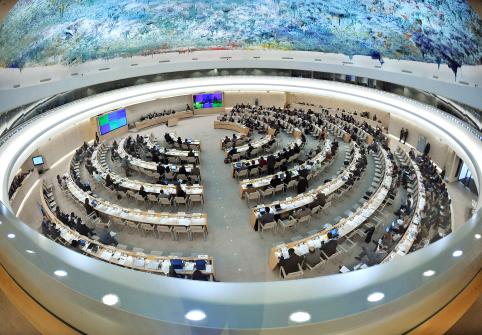News
HBKU Professor Dr. Dena Al-Thani Presents Research on Disability Access at UN Human Rights Social Forum
29 Oct 2016
Dr. Dena Al-Thani, assistant professor at Hamad Bin Khalifa University (HBKU), presented her research on technological innovation and accessibility at a United Nations event held in Geneva, Switzerland. Invited by the Office of the United Nations High Commissioner for Human Rights (OHCHR), Dr. Al-Thani attended the three day 2016 Social Forum of the Human Rights Council and spoke at a panel on accessibility and non-discrimination, sharing insight on how to better integrate the visually impaired in the workplace and in educational settings.
In recognition of the tenth anniversary of the adoption of the Convention on the Rights of Persons with Disabilities (CRPD), the event focused on promoting full and equal access to fundamental freedoms to all people with disabilities and leaving no one behind in the push for the UN Sustainable Development Goals. Dr. Al-Thani explored the role of computing research in increasing accessibility to the digital world and its relevance for achieving more and better employment. She noted: “As the internet becomes more integrated into our daily lives, web accessibility becomes more than merely a moral obligation that is optional to satisfy. In fact, it is becoming a legal obligation in many developed and developing countries.”
“In our research work, we looked into the area of inclusive design from a different perspective. We studied the collaboration between Visually Impaired (VI) and sighted users in performing complex, collaborative web searches, in which the users sat together and searched for information. Our work addresses a significant gap in current assistive technology, wherein technology to support individual web searching is relatively well developed, but nothing exists explicitly to support collaboration of VI users with their sighted peers in a workplace or educational setting.”
Dr. Al-Thani provided civil society actors, representatives of member states, and intergovernmental organizations in attendance at the event with observations from her research study and clear, cost-effective, practical and easy-to-implement design recommendations that can enhance the productivity and integration of people with disabilities. She also emphasized the importance of involving target users in the design and evaluation process of a software development life cycle to ensure accessibility is kept in mind when developing the next generation of collaborative accessibility tools for the visually impaired.
The HBKU professor, who is part of the faculty of the university’s College of Science and Engineering, acknowledged on her return to Qatar that participation in events like the Social Forum gives academics and researchers the opportunity to highlight the effective role academic research plays in addressing global issues: “Sharing insights from academia can have a tremendous effect in strengthening the links between research, industry, policy makers and the international community. Such an event provides a great opportunity for us as academics and researchers to build bridges between these different domains.”
By taking an integrated approach to education and research, HBKU aims to problem-solve some of the greatest challenges facing Qatar and the world. The homegrown institution works collaboratively with a number of partners from the government, private sector, and wider community to produce knowledge that is not only locally relevant, but also globally impactful, in an effort to build a brighter, more accessible and sustainable future for the world.
